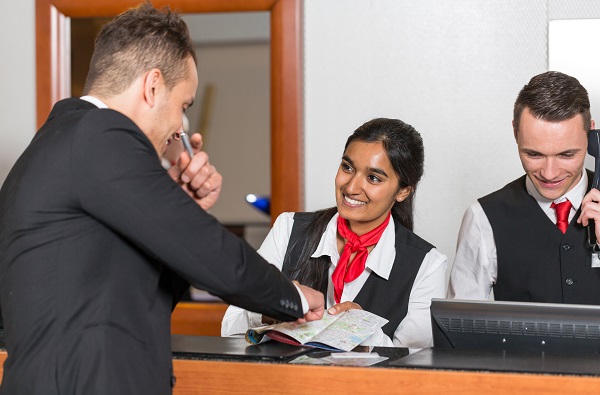The flesh-eating virus accom is inviting in
This week, Intercontinental Hotels Group CEO Keith Barr hosed down fears that global internet giants were taking control of customers, saying: “We are always essentially going to own the stay.”
Richard Warnick begs to differ..
If you thought the battles over online travel agencies and other intermediaries have been a struggle in the hospitality industry, you ain’t seen nothin’ yet.
The emerging battle—or more appropriately, the war—over who owns the customer relationship and data has been quietly raging for some time. I say quietly because it has been covert. But it is now becoming very overt.
As far as I can tell, the industry’s first “public” return fire came from Marriott International President and CEO Arne Sorenson during the CEOs Check In panel at the NYU International Hospitality Industry Investment Conference.
He clearly understands the magnitude of the threat, but I’m not sure others do. And even in the case of Marriott, understanding does not seem to be translating into an education and action campaign with respect to their vast network of hotel owners and employees, at least not yet.
Let me provide a brutally honest assessment of where things stand on this critical issue.
With respect to Facebook, Amazon and Google, the war is already over, and they are victorious. They know more about their millions (or billions) of users than those users know about themselves. An interesting data point here is that Facebook has claimed that after a user has liked eight things—pictures, brands, etc.—they know that user better than their spouse.
While the hotel industry revelled in self-satisfaction over CRM data tracking what kind of pillow you like or what newspaper you prefer, these behemoths were accumulating mountains of intimate data on every single user or customer.
They know what you’ve bought and what you want to buy, when you bought it or want to buy it, what you like or dislike, where you are, where you have been and where you want to go.
While owners and hotel managers fight vociferously over which one owns basic customer data like name, address, phone and email, real ‘customer influence data’ is being shovelled out from under their noses by the gigabyte.
The only question that remains of Facebook, Amazon and Google is whether they will engage with the hotel industry as George Marshall did in post-WWII Europe, or as Attila the Hun did in the 5th century. As it regards Facebook, Amazon and Google, the hotel industry has been consigned to a strategy of hope and pray.
That said, many other players are also engaged in this war for ownership of customer relationships and data, and it is not yet too late to react.
Some, like Sorenson, have awakened to the threat to their business—loyalty, wallet share, intermediation costs and so on.
But the volume on the wake-up call must be turned up much louder, and the industry response must be much more strategic. Believing that our unique face-to-face contact with customers will offset the predatory practices of technology-based customer relationships just won’t cut it.
The foxes are in the hen house
Take Expedia, for instance. In 2017, Expedia invested $26 million in Alice—a SaaS technology company that provides hotels with an operations platform that allows hotel guests to use an app on their smartphones to request services—and helps the hotel effectively manage delivery of such services.
In addition to Alice, Expedia’s suite of data analytics tools includes a free service that aims to help hotels set their rates to command the most revenue, a meetings-and-events automated booking tool, a tool that helps hotel managers analyze guest review data to improve ratings, and a concierge tool.
Now why do you think Expedia is aggressively expanding these technology platforms for hotels, and why would they be willing to provide these technologies for free or at a below-market price? If altruism is your response, you fail the quiz. Here’s a hint in the form of an excerpt from an August 2017 Skift article announcing Expedia’s investment in Alice:
“Expedia’s interest in Alice suggests that the online travel company is curious about possibly providing more back-end software services for the hotels that use it to market and distribute their inventory globally.”
The fact is, Expedia knows everything about a substantial percentage of your customers until they enter the four walls of your hotel.
With these free tools and the addition of Alice plus GoConcierge, which is now owned by Alice, Expedia has entered the building with the ability to harvest all of your guests’ activities, preferences and data. The Trojan Horse is parked in your lobby, and you have welcomed it in.
Think about it. Expedia is a company that, without a single dollar invested in physical inventory:
- takes 15 percent to 25 percent of every booking;
- displays competing hotels in pay-to-play search order;
- has a customer loyalty program, Expedia Rewards, that competes with hotel brands;
- offers competing lodging options (e.g. Homestay);
- offers your customers concierge services pre- and post-reservation (e.g. transportation, restaurant reservation, events); and
- wants ‘your’ guest engagement data and hotel operational data.
Oh, by the way, they won’t even share basic customer data like email and phone number even though it is your customer.
To what purpose do they do this, and to whose advantage?
You are being massively disintermediated from your customer, and worse, many are currently complicit in the process. And by being complicit in the process, you are accelerating the intermediation and optimising someone else’s business to the detriment of your own.
Of course, Expedia is simply one of many companies trying to capture and then intermediate hotels’ customer data—not simply to their benefit, but simultaneously to hotels’ expense. Companies like Priceline and Agoda are actively evaluating and/or pursuing similar strategies.
One further point to consider is that data is a flywheel—meaning the more data you have, the better the recommendations you can make. The better the recommendations you make, the more likely the customer is to respond to it, giving you more data to make better recommendations and on and on. This also provides the foresight to recognise changing behaviours as well. In other words, the problem gets worse as you go. It’s time to get off the train! The trip back gets more difficult the longer you wait.
It’s one thing to welcome symbiotic parasites into our personal biome, as evidence of the many millions of beneficial bacteria living happily in our gut. It’s quite another when the invitation is extended to an Ebola virus.
Hello hotel industry, is anybody listening?
See the original article here:
http://www.hotelnewsnow.com/Articles/288683/Who-owns-the-customer
Richard Warnick is managing director and co-chairman of CHMWarnick, a provider of hotel asset management and owner advisory services.








How Long will it take for our Tourism Leaders to get THIS !!
Finally the head of the largest hotel chain in the world acknowledges but it will takes years to filter down into local. This “pandemic” requires immediate action from all Tourism leaders starting with the Tourism Minister, the state ministers and then RTO’s & LTO’s.
The problem, like all pandemics can be addressed if we unify the industry immediately but it wont whilst those at the top behave like Ostrich with their head in the sand.
The meeting in Port Douglas several months ago demonstrated the direction,
IF SOMEONE WOULD JUST SHOW SOME LEADERSHIP!!!
https://www.accomnews.com.au/2018/06/the-town-where-otas-are-considered-as-deadly-as-the-crown-of-thorns-starfish/
Great article Richard, however the underlying issue tends to be the operator themselves and the innate sense of complacency that seems to have implanted itself in the industry. Too many operators readily accept the next piece of technology, especially when it’s offered for free, without engaging their brain to think about the wider ramification of their decision.
Operators that grabbed the FREE website from Booking Suite are great examples of this. These same operators hate Booking.com and the control they have over their business with a passion, yet hand them the keys to their shop window without thinking twice simply to avoid investing in a basic website. Not enough engaged operators to win this war unfortunately